1. Crispin
2. Douglas
3. Ponsonby
4. Butch
5. Thaddeus
6. Hubert
7. Wilhelm
8. Edgar
9. Aloysius
10. Wee Jim
11. "The Suitcase"
12. Oberon
These may or may not be the names of the Shi'er Xiansheng [12 Gentlemen], but wouldn't it be nice if they were?
Purple-clad, deluxe, freshly-minted thanks to our roving Yunnan monkly chum for provision of this buxom pair (and thanks to Scott for post and packing):
During his time in Kunming, Nada has been impressed by the thorough "geekiness" of the 12 Gentlemen with respect to pu'er. I appreciate their simplicity, and their small annual output: I am a big believer that a premium brand can maintain its high quality over a small number of different productions each year, but, once the number of different offerings becomes too large, quality must be sacrificed.
The calligraphy on the above wrappers reads "weizhongwei" [taste within taste], and the Menghai cake is pictured right.
The cakes are tight. TIGHT. Good grief, are they tight. I can see those tasked at with compression at Xiaguan raising an eyebrow or two over the uberfusion that has occurred with these bing. They must have used some serious machinery to get these flinty little beasts pressed. The term "iron bing" really isn't strong enough.
Below, I have shown the profile of this heavy little discus.
Getting leaves out of this cake is not at all easy. I'm a fan of loose compression because I don't like to mangle my leaves. Also, looser compression (and resultant increased movement of air) seems to provide more rapid aging - all of our tightly compression Xiaguan teas are aging much more slowly than their looser peers.
Below, evidence of my attempts to get some leaves out of this cake. Patience is the name of the game. I am reminded of the story from Chuangzi, in which the butcher effortlessly passes his knife between muscles and bones, causing meat to fall off with no force. In contrast, I feel as if I am chipping away like an amateur miner.
Well, perhaps not quite that bad: I use the very tip of the pu'erdao to edge into the circumference of this disk, and wiggle gently, trying to insinuate my way between strata. Not using force is the key, and to attempt access in many different sites around the edge. Eventually, a section lifts off, as shown above (the dust around the outside is evidence of my initial failed attempts).
(N.b., later sessions reveal that one side of the cake is very definitely separated from the other. It feels as if the mold was half-filled with leaves, tightly compressed, and then the mold filled to capacity with more leaves for a second pressing.)
The resultant chunks I place directly into the rinsed teapot, rather than attempting to separate them into their constituent leaves - hot water will do a much better job, without the possibility of tearing.
Eventually, we get to drink some tea! The soup is pure and clean, gratefully-received evidence that I have not torn too many leaves. The colour is absolutely yellow, unequivocal and straight, indicating that the 12 Gentlemen have not been knobbling around with the processing.
There is a great deal of energy in the mouth, and a superb sweetness packed in with some fine Menghai mushrooms. Vibrant, clean, and impressive.
It stays long in the throat, ringing with sweetness.
Boatloads of chaqi leave me feeling that the quality of the leaves is fine. The above shot shows the shrivelled remains of some leaves I intended to photograph, but were then abandoned as I went out for a picnic with my dear wife.
The 12 Gentry are totally uncompromising: the soup is blindingly yellow, being brutally raw, while the leaves are then further chopped down to size, in the Old School method. There is absolutely no concession to "drink it now". It makes quite a change compared to lots of modern cakes (and I totally adore both modern and traditional young shengpu, as regular readers will know).
A tasty bing. Repeated sessions bore similar fruit - tasty tea, and configured for the long haul.
2. Douglas
3. Ponsonby
4. Butch
5. Thaddeus
6. Hubert
7. Wilhelm
8. Edgar
9. Aloysius
10. Wee Jim
11. "The Suitcase"
12. Oberon
These may or may not be the names of the Shi'er Xiansheng [12 Gentlemen], but wouldn't it be nice if they were?
Purple-clad, deluxe, freshly-minted thanks to our roving Yunnan monkly chum for provision of this buxom pair (and thanks to Scott for post and packing):
During his time in Kunming, Nada has been impressed by the thorough "geekiness" of the 12 Gentlemen with respect to pu'er. I appreciate their simplicity, and their small annual output: I am a big believer that a premium brand can maintain its high quality over a small number of different productions each year, but, once the number of different offerings becomes too large, quality must be sacrificed.
The calligraphy on the above wrappers reads "weizhongwei" [taste within taste], and the Menghai cake is pictured right.
The cakes are tight. TIGHT. Good grief, are they tight. I can see those tasked at with compression at Xiaguan raising an eyebrow or two over the uberfusion that has occurred with these bing. They must have used some serious machinery to get these flinty little beasts pressed. The term "iron bing" really isn't strong enough.
Below, I have shown the profile of this heavy little discus.
Getting leaves out of this cake is not at all easy. I'm a fan of loose compression because I don't like to mangle my leaves. Also, looser compression (and resultant increased movement of air) seems to provide more rapid aging - all of our tightly compression Xiaguan teas are aging much more slowly than their looser peers.
Below, evidence of my attempts to get some leaves out of this cake. Patience is the name of the game. I am reminded of the story from Chuangzi, in which the butcher effortlessly passes his knife between muscles and bones, causing meat to fall off with no force. In contrast, I feel as if I am chipping away like an amateur miner.
Well, perhaps not quite that bad: I use the very tip of the pu'erdao to edge into the circumference of this disk, and wiggle gently, trying to insinuate my way between strata. Not using force is the key, and to attempt access in many different sites around the edge. Eventually, a section lifts off, as shown above (the dust around the outside is evidence of my initial failed attempts).
(N.b., later sessions reveal that one side of the cake is very definitely separated from the other. It feels as if the mold was half-filled with leaves, tightly compressed, and then the mold filled to capacity with more leaves for a second pressing.)
The resultant chunks I place directly into the rinsed teapot, rather than attempting to separate them into their constituent leaves - hot water will do a much better job, without the possibility of tearing.
Eventually, we get to drink some tea! The soup is pure and clean, gratefully-received evidence that I have not torn too many leaves. The colour is absolutely yellow, unequivocal and straight, indicating that the 12 Gentlemen have not been knobbling around with the processing.
There is a great deal of energy in the mouth, and a superb sweetness packed in with some fine Menghai mushrooms. Vibrant, clean, and impressive.
It stays long in the throat, ringing with sweetness.
Boatloads of chaqi leave me feeling that the quality of the leaves is fine. The above shot shows the shrivelled remains of some leaves I intended to photograph, but were then abandoned as I went out for a picnic with my dear wife.
The 12 Gentry are totally uncompromising: the soup is blindingly yellow, being brutally raw, while the leaves are then further chopped down to size, in the Old School method. There is absolutely no concession to "drink it now". It makes quite a change compared to lots of modern cakes (and I totally adore both modern and traditional young shengpu, as regular readers will know).
A tasty bing. Repeated sessions bore similar fruit - tasty tea, and configured for the long haul.
Addendum
June, 2013
"What's that, at the back of my shelf, squatting behind the lapsang?" I thought to myself.
Of course, my old friend, the 12 Gentlemen "Menghai"...
2007 seems like long ago, but it was only six years. How much has changed in the interim! Has the cake changed, too?
There is just one portion removed from the cake, evidence that it has remained untouched since I bought it (well, since Norpel bought it for me) some time ago.
The leaves look quite dark now, and carry a forthright "plummy" scent that suggests this cake is not in the state in which I left it.
The rinse is a yellow-brown colour, which is certainly different to the dazzling yellow of its early days.
The aroma cup holds a scent that is typical "Menghai": dark, low, and sweet. This particular cake's scent is long-lasting and gradually, after so very long, it folds into a brown-sugar lengxiang [cooling scent]. This duration is remarkable.
In the intervening years, this cake has changed a great deal - something that is slightly hinted by the change in colour, shown above, to a solid orange. The soup is instantly cooling, testimony to the fact that the leaves are of good quality. The base has settled into a low sweetness, with a rich and humid feeling to it. All the while, the tongue buzzes uncontrollably, especially at the tip of the tongue. It tastes, records my journal, "rather like a fizzy and cooling version of a good Changtai cake from their decent period."
Then, something odd happens. It feels as if I have woken this cake from the middle of its pupation: it is at an interim stage where it has not yet attained the woodiness of age, but where it is absolutely different to its original character. The extremely tight compression has not preserved its youth in any way, which is worth noting. While the youthful flavours have settled and deepened, the raw bitterness of its youth remains in quantity - this cake needs more time, but has the contents to become a good aged cake.
My journal simply records "ick".
My journal simply records "ick".

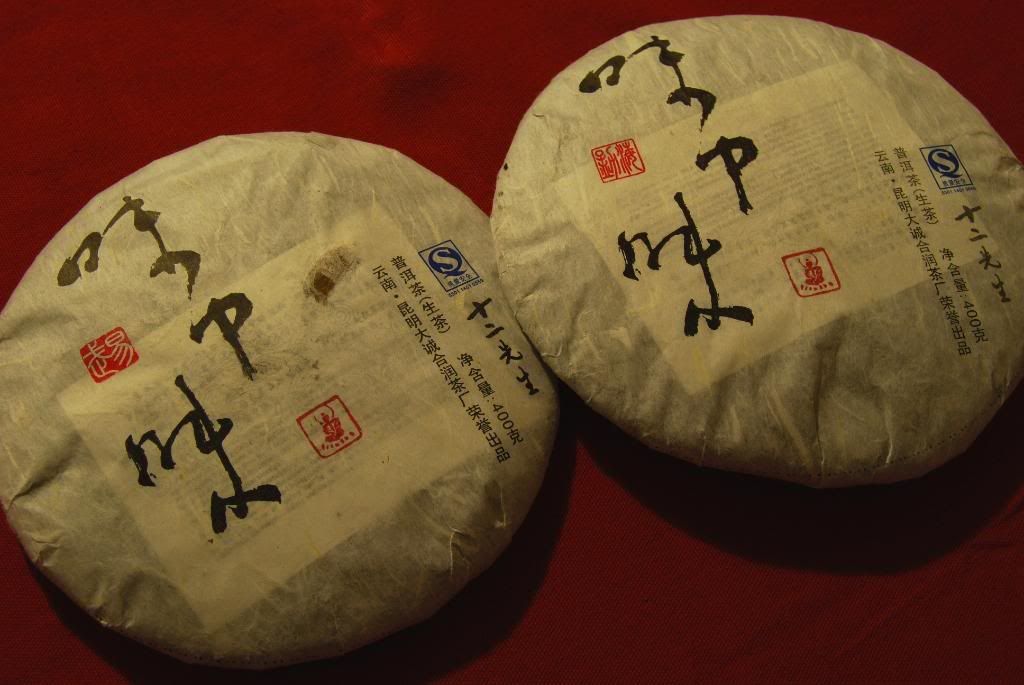
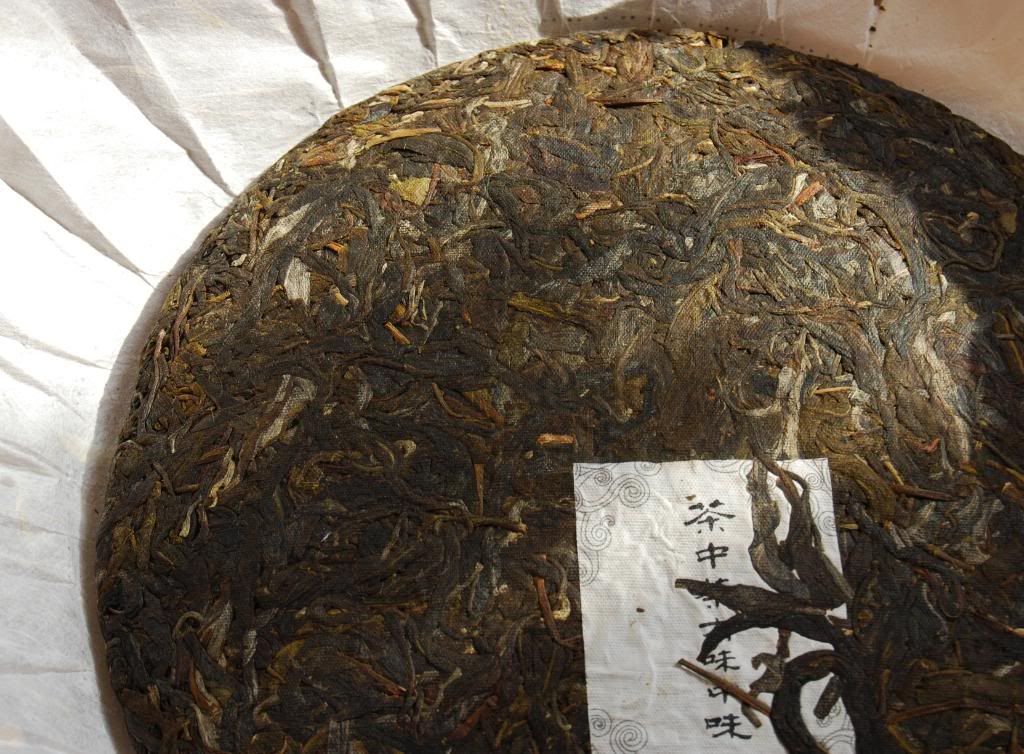
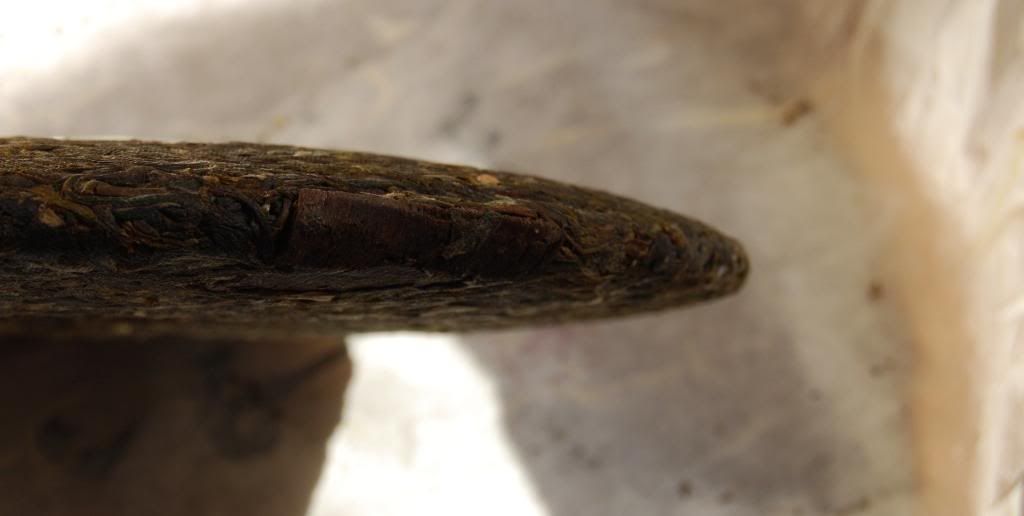
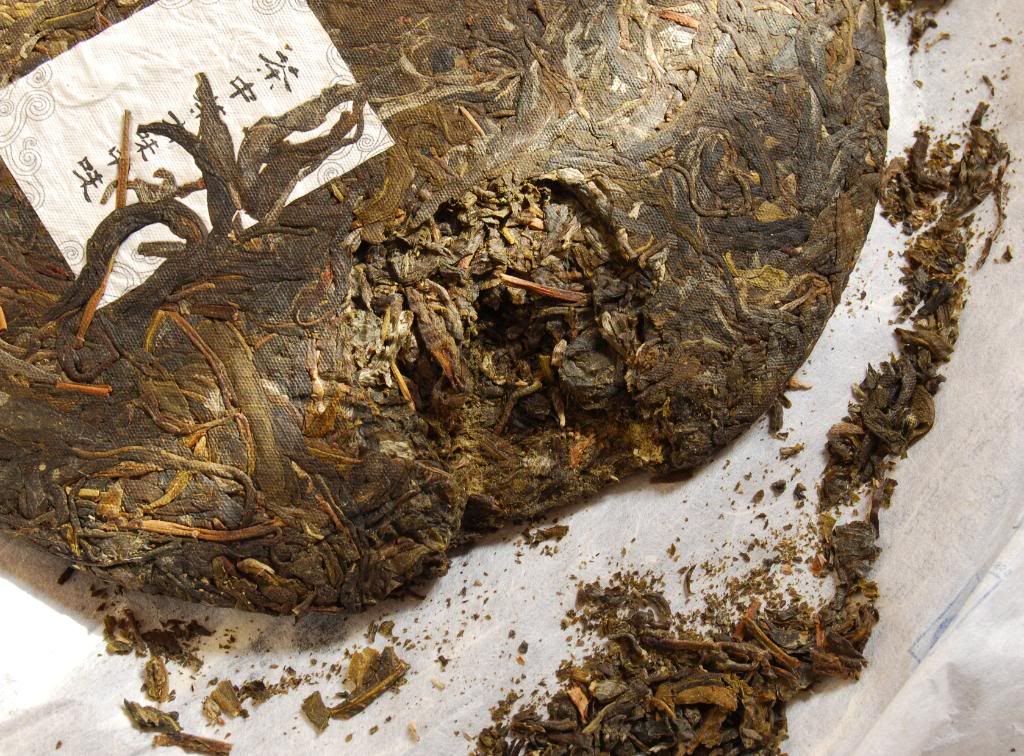
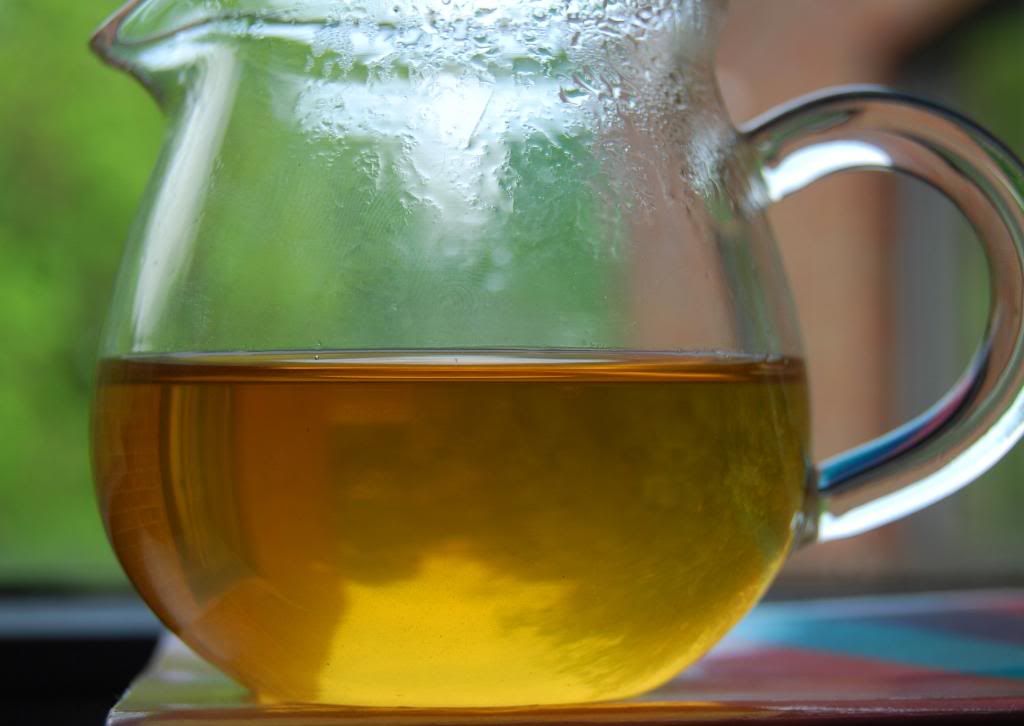
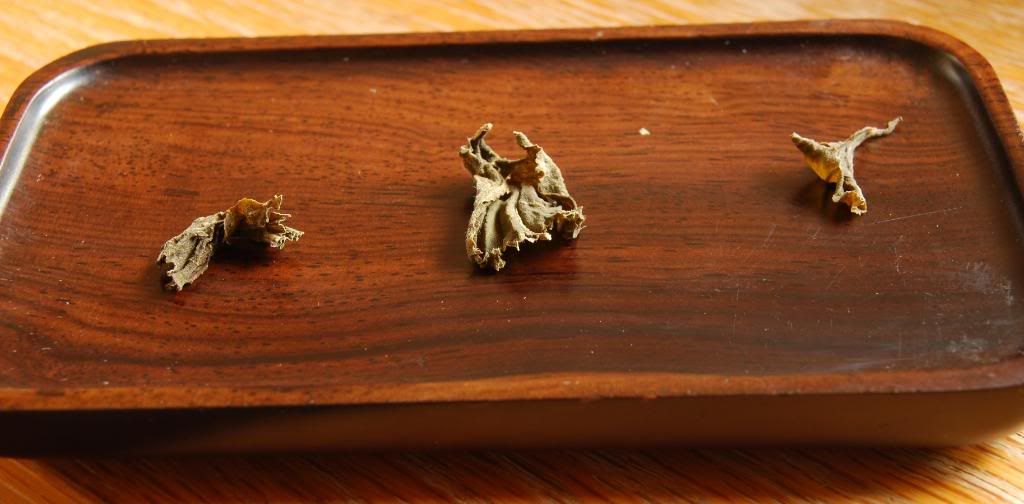

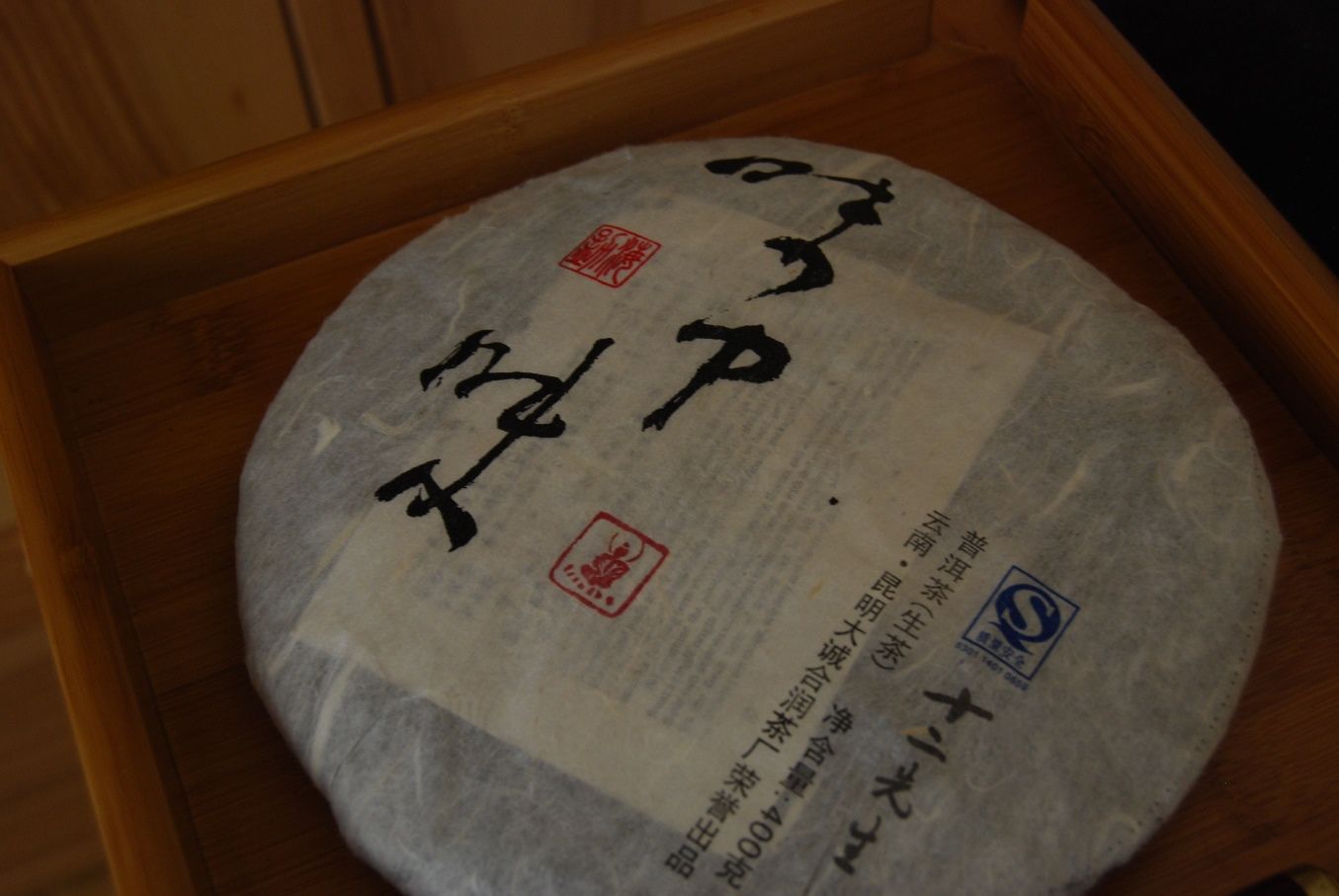

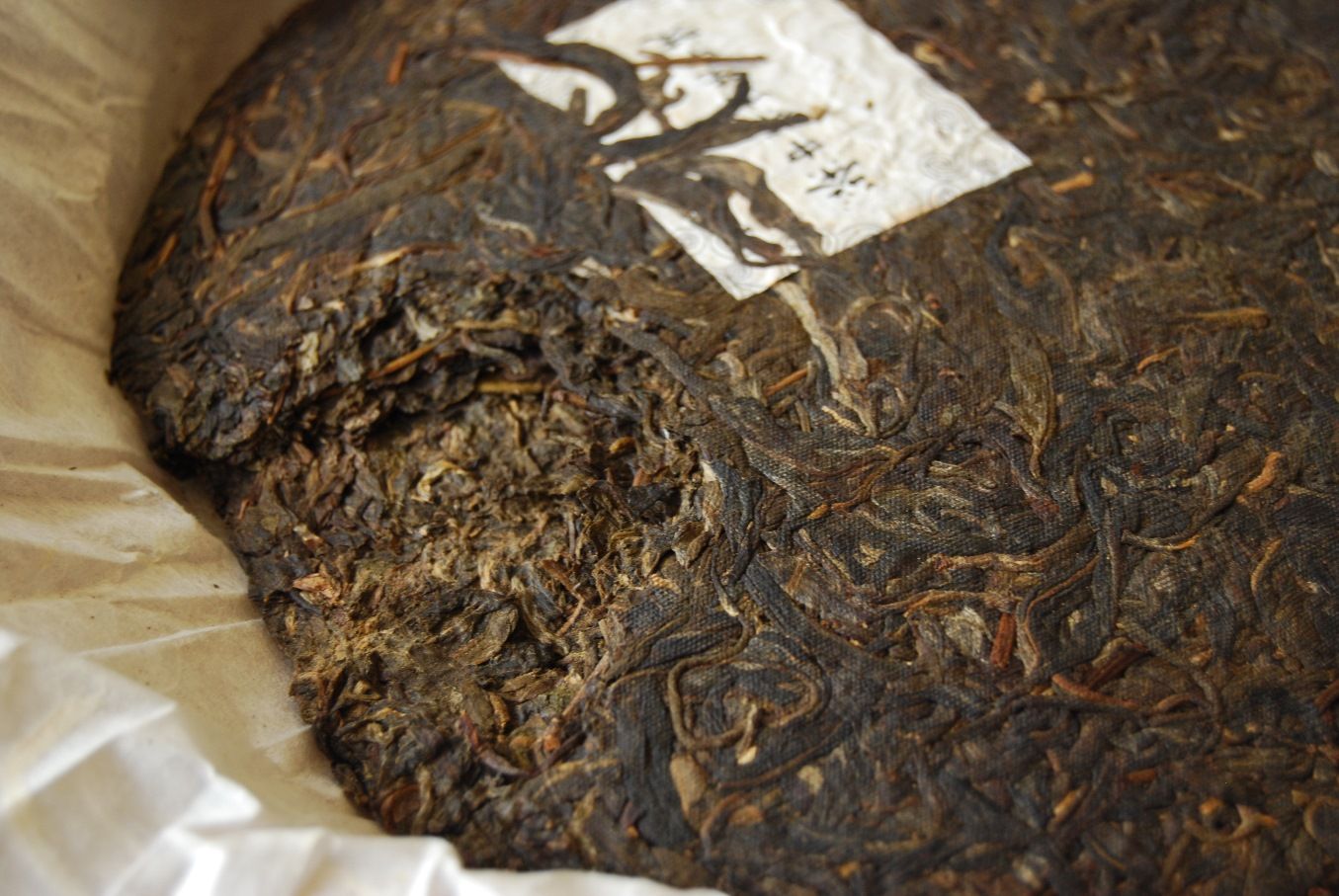
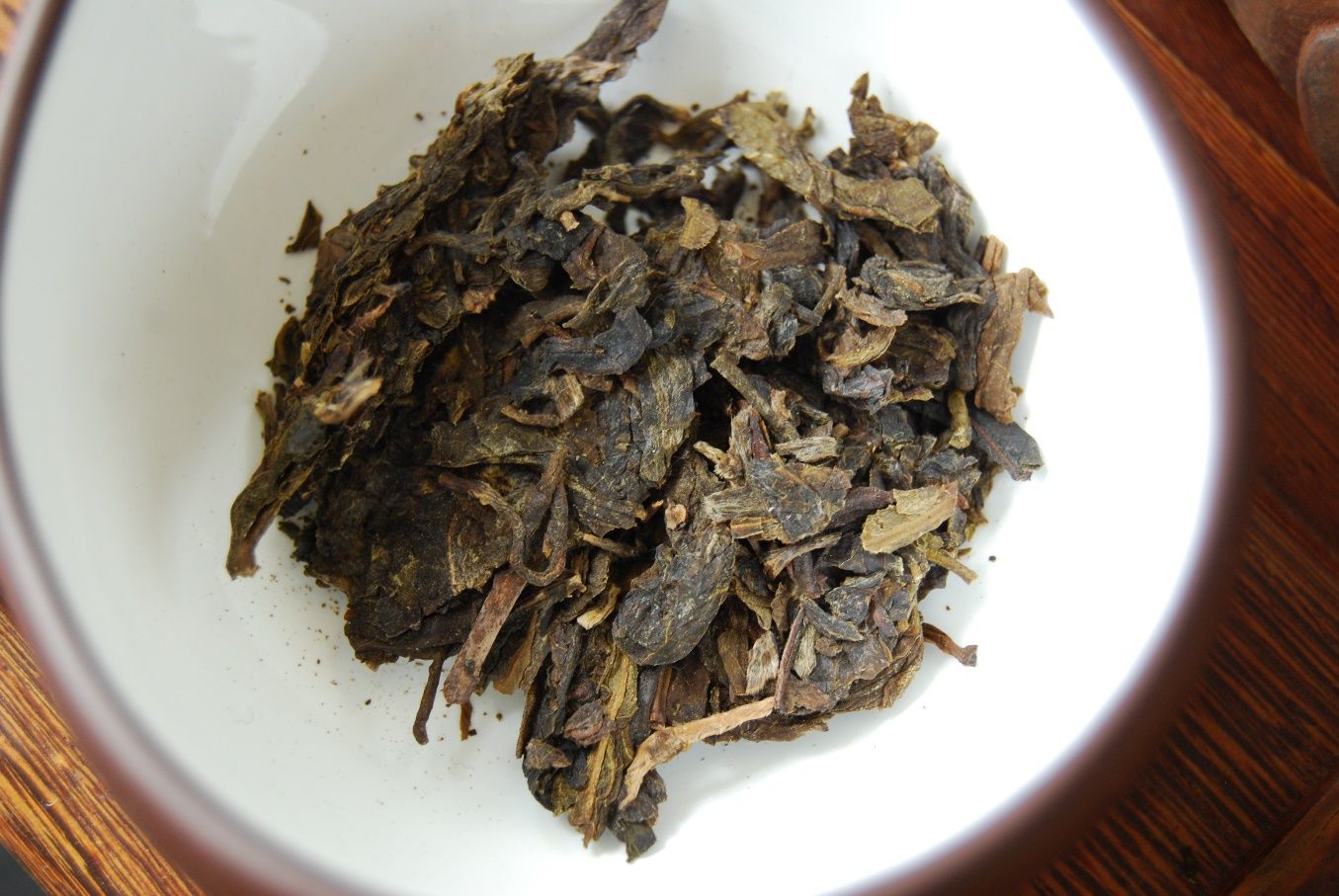

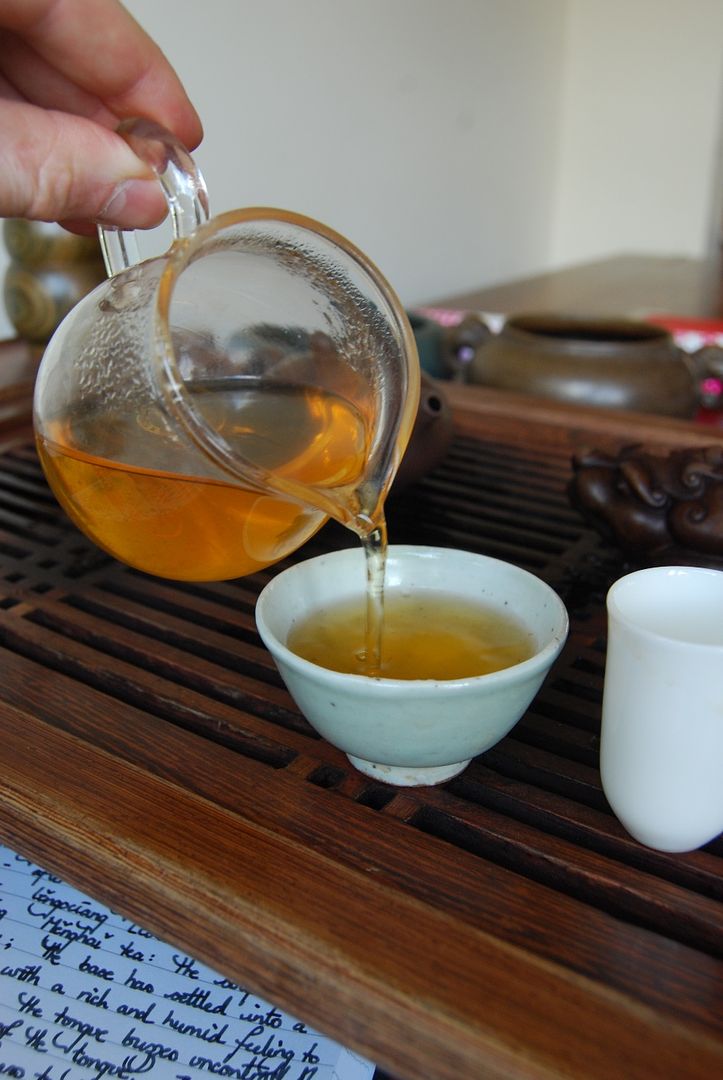
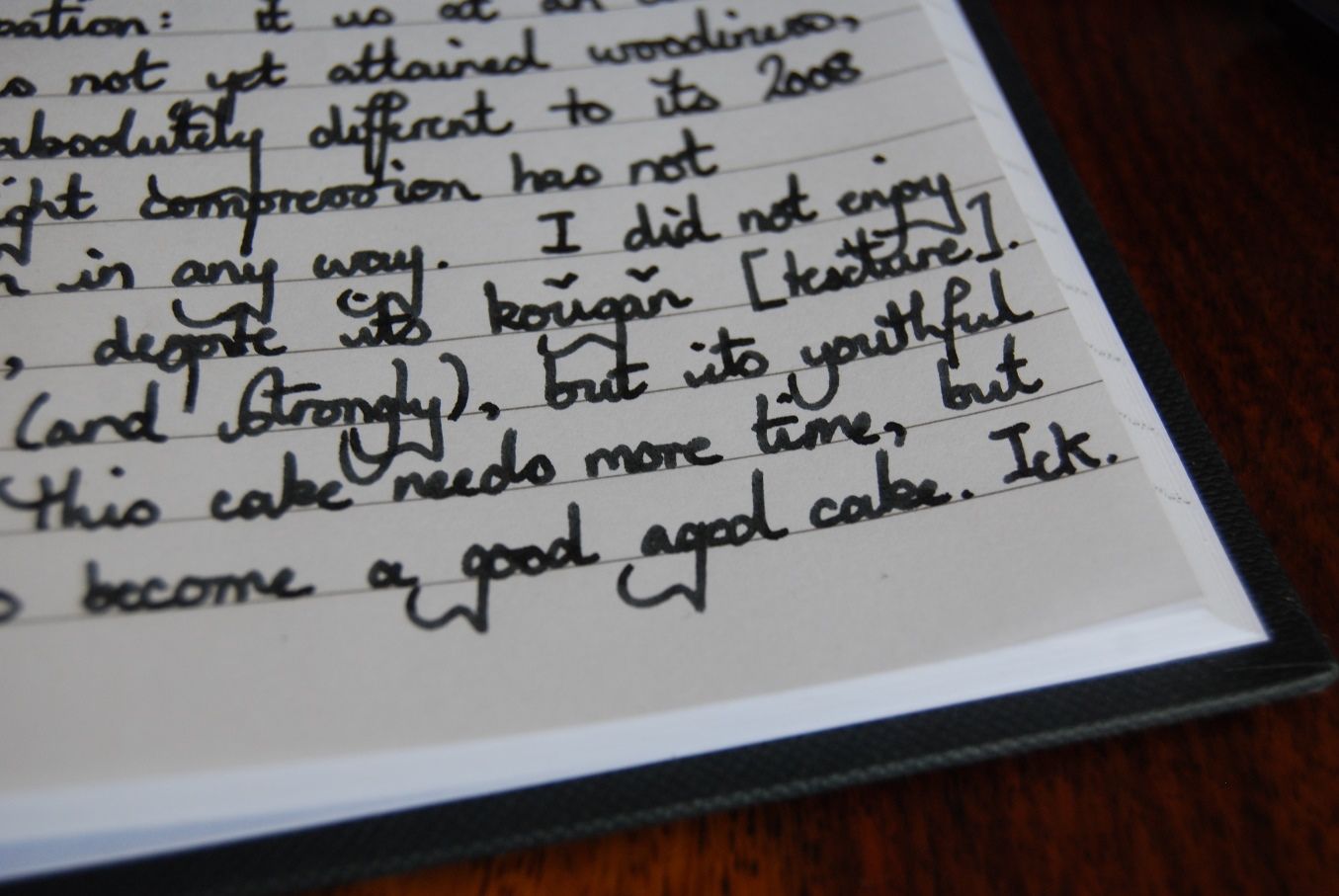
12 Gentlemen actually refers to the 12 tools you use for tea (back in the day).
ReplyDeleteHaving tried again their 2006 offering, I must say I was not particularly impressed by the tea. It was of middling quality. The extreme compression is a bit of a problem -- if you store these teas in a location that is anything less than humid, you're going to have to take a long, long time before it turns into anything. Not bad if you like them young, I suppose.
Dear MarshalN,
ReplyDeleteI rather anticipated a comment from you on publishing this one, for some unknown reason. Glad to have you drop by, pull up a pew.
They certainly are tight, that's my main (and, quite possibly, only) criticism. C'est la vie - they can keep my Xiaguan company. Not that I expect them to last very long, given my appetite for this tea...
Toodlepip,
Hobbes
Boatloads of chaqi sounds...good.
ReplyDeleteHas Nada been able to cast light on the reason for the extreme compression from the producers?
Interested to know as the producers appear to have been meticulous with so many of the variables (quality of leaf, packaging etc) and yet...
Lethargus
Excellent! I have heard the words of a pu-erh aficionado and learned how to care for life!
ReplyDelete-Lord Wenhui
Dear Lethargus,
ReplyDeleteMeticulous they seem to be - I'd love to hear their reasons for such compression, too. Actually, I'd expect it to age faster than a tuocha of similar compression, given the greater surface area of the bing. Let's see how it does. :)
Dear Wes,
I'm just a humble tea-drinker is all, but thanks for the kind words. :)
Toodlepip both,
Hobbes
Dear Hobbes,
ReplyDeleteI was surprised by the tight compression on my first encounter with their bings too.
When asked about this, they replied that their aim is to produce tea which will be as good as possible in it's old age, aging slowly and finely throughout the years. Perhaps I subsequently imagined this, but I believe the word 'masterpiece' was mentioned in the description of their aims by my translator.
I agree it makes separating whole leaves a little more difficult, but have found that using a tuocha pick in several close locations allows one to prise off layers which can be loosened in the pot with some hot water.
I'm glad you're enjoying the brew though - I've bought a few of these to hopefully accompany me over many years of pu drinking.
nada.
One of the guys in the core group of 12 Gents was (dunno if he still is) a frequent and rather important contributor to Sanzui posts. I think judging from the sort of thing he says... the one thing that worries me a little is that many of them seem to be of the "dry stored only" school.
ReplyDeleteI think them being based in Kunming, there isn't really a worry about aging slowly, is there?
Dear Nada,
ReplyDeleteThanks for the extra details. I figured that it would be a conscious choice, with the aim being something special at the end of the line. :)
I'm glad to hear that you've got some for yourself - I have some notes on the other teas coming imminently. We've loved them all, without exclusion. I think the Yiwu was the finest.
Dear MarshalN,
I think it's safe to say that they're keen on dry storage, yes. :)
Here's hoping the dampness of the UK climate will give them a leg up.
Toodlepip all,
Hobbes
Yep, they do seem to be firmly in the 'dry-stored only' camp. This seems to be a common trait in Kunming, just as I met many people in Hong Kong who enjoyed the wet-stored taste.
ReplyDeletePerhaps people come to appreciate the teas that they're surrounded by, and enjoy those flavours.
Personally I enjoy some of the rounded flavour that a little humid storage can bring, really prefer my pu not to have the musty taste that most oldish pu from the very south of China carries.
I too am hoping that the wet Irish climate will give my pu some aging potential - I guess on that side of the world it's really an experiment, although Mme. Tseng from Maison de Trois Thes reckons that Paris is perfect. I guess Oxford isn't so far away from there. If she's right, your pu should evolve nicely Hobbes.
I think it is a universal law of tea sellers that whatever they have, they will say is good. That's just how the cookie crumbles, as they say in America. It's natural for Kunming merchants (and likewise, Beijing ones) to shower disdain on wet stored teas because their storage conditions will never, ever, produce that kind of taste, not within their lifetime, anyway.
ReplyDeleteMusty tea can be restored to good health -- just ask Cloud.
As for Mme. Tseng -- she's a tea seller, therefore the above law applies :)
Dear Nada and MarshalN,
ReplyDeleteEnjoying teas we're surrounded by... up to a point! I'm surrounded by PG Tips here, but don't drink it too often. ;)
I also like a little wet-storage to my tea, but perhaps my favourites so far happen to be dry-stored. I know some folk cannot abide the dampness of South China teas, but I'm not among them (even if my preference is for dry-storage).
Regarding Mme. Tseng (Mme. Cang?), I can see why she would come to the conclusion about Parisian tea. It's a shame that the minute someone becomes a vendor, we have to treat their opinions with caution - this time, I agree with her! Paris has very similar geography to Oxford in terms of climate, location, humidity, and placement/size of local rivers, and I favour Oxford for tea storage - I would expect Paris to be very similar. In fact, we have many tong of tea left in our Chinese home for aging, just for convenience, but think we will probably move it to Oxford for the long haul. Northern Ireland has to be very similar - maybe even better, if it's got that Manchester/Bristol climate. I think you'll be sitting on some pleasant teas before too long, Nada!
Toodlepip both,
Hobbes
I think Paris/Oxford would be too far south...especially with all this global warming stuff...
ReplyDeletePossibly the ideal location would be...
somewhere in Scotland.
Yes - I'm sure I read that as a fact..somewhere...
;-)
Lethargus
From Islay? Nice atmosphere, good access to water, plentiful humidity. I hear they make some form of booze there!
ReplyDeleteDear MarshalN,
ReplyDeletePerhaps not a universal law - there are some honest exceptions, but I can agree that it's a pretty good rule of thumb with vendors here in China.
Drinking tea, like most things, is a highly subjective affair and there's certainly enough room to have a wide selection of options available for those who wish. There are many loosely pressed bings available, perhaps a concurrent alternative approach is something to be welcomed.
I meet many people here with opinions on tea and storage, many of which are highly contradictory. For me, I listen and try to gain something from whatever experience this person may have on the subject, pose some questions if their views are different from mine, and reserve judgement until I can satisfy myself as to whether or not I can subscribe to their way of thinking.
That said, I do know that I don't really enjoy drinking tea that has very much of a wet stored taste, such as most of the tea I encountered in Hong Kong. A little humid, I can handle, but beyond that and I have some aversion to the musty/mouldy flavour. As I remember, Cloud felt the same.
I guess it just comes down to - 'If you like it, drink it. If not, leave it for someone else who may.'
nada.
Well, I think Paris is probaly better for storing pu ehr than let's say the sahara.
ReplyDeletebut most parisians are in central heated appartments.
Paris is dryer than oxford or norhern ireland and I think Ireland and the UK is probably even a little better for long term storage.